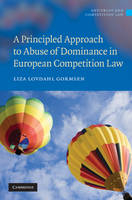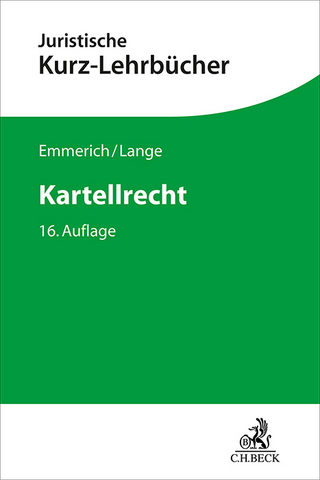
A Principled Approach to Abuse of Dominance in European Competition Law
Seiten
2010
Cambridge University Press (Verlag)
978-0-521-76714-9 (ISBN)
Cambridge University Press (Verlag)
978-0-521-76714-9 (ISBN)
While many European Community lawyers would accept and welcome the objective of consumer welfare, the Community Courts often favour economic freedom instead. Liza Lovdahl Gormsen questions whether the Commission's chosen objective of consumer welfare is legitimate.
Three questions surround the interpretation and application of Article 82 of the EC Treaty. What is its underlying purpose? Is it necessary to demonstrate actual or likely anticompetitive effects on the market place when applying Article 82? And how can dominant undertakings defend themselves against a finding of abuse? Instead of the usual discussion of objectives, Liza Lovdahl Gormsen questions whether the Commission's chosen objective of consumer welfare is legitimate. While many Community lawyers would readily accept and indeed welcome the objective of consumer welfare, this is not supported by case law. The Community Courts do not always favour consumer welfare at the expense of economic freedom. This is important for dominant undertakings' ability to advance efficiencies and for understanding why the Chicago and post-Chicago School arguments cannot be injected into Article 82.
Three questions surround the interpretation and application of Article 82 of the EC Treaty. What is its underlying purpose? Is it necessary to demonstrate actual or likely anticompetitive effects on the market place when applying Article 82? And how can dominant undertakings defend themselves against a finding of abuse? Instead of the usual discussion of objectives, Liza Lovdahl Gormsen questions whether the Commission's chosen objective of consumer welfare is legitimate. While many Community lawyers would readily accept and indeed welcome the objective of consumer welfare, this is not supported by case law. The Community Courts do not always favour consumer welfare at the expense of economic freedom. This is important for dominant undertakings' ability to advance efficiencies and for understanding why the Chicago and post-Chicago School arguments cannot be injected into Article 82.
Liza Lovdahl Gormsen teaches EU and UK competition law at London School of Economics and Political Science. She is also a visiting lecturer at Durham University.
1. Introduction; 2. Consumer welfare theory, different schools of thought and efficiencies; 3. Objectives; 4. The legitimacy of the consumer welfare goal in Article 82; 5. The role of effects in Article 82; 6. Guidelines; 7. The way forward.
| Reihe/Serie | Antitrust and Competition Law |
|---|---|
| Verlagsort | Cambridge |
| Sprache | englisch |
| Maße | 158 x 235 mm |
| Gewicht | 490 g |
| Themenwelt | Recht / Steuern ► EU / Internationales Recht |
| Recht / Steuern ► Wirtschaftsrecht ► Wettbewerbsrecht | |
| Sozialwissenschaften ► Politik / Verwaltung ► Europäische / Internationale Politik | |
| ISBN-10 | 0-521-76714-8 / 0521767148 |
| ISBN-13 | 978-0-521-76714-9 / 9780521767149 |
| Zustand | Neuware |
| Haben Sie eine Frage zum Produkt? |
Mehr entdecken
aus dem Bereich
aus dem Bereich
eine systematische Darstellung des deutschen und europäischen Rechts
Buch | Softcover (2023)
C.F. Müller (Verlag)
CHF 62,95


